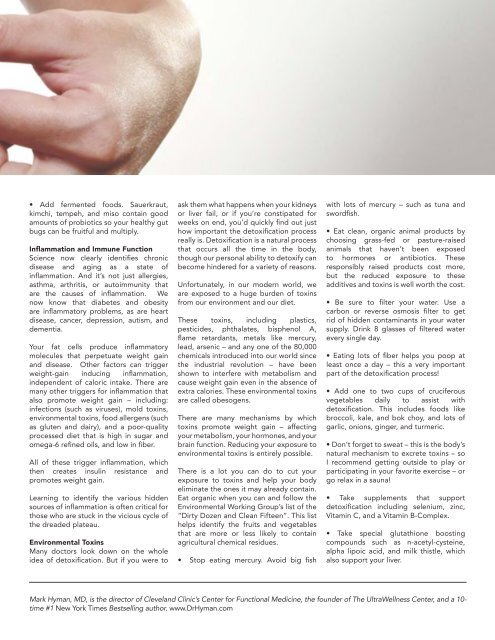24/Seven October 2017
Change Your Attitude...Change Your Life 24 Seven is a digital magazine that provides readers with the tools needed for personal growth, professional development, and self-empowerment. Each month, nationally recognized experts and leaders in their field, provide advice in areas such as spirituality, self-help, personal finance, health, wellness, and business.
Change Your Attitude...Change Your Life 24 Seven is a digital magazine that provides readers with the tools needed for personal growth, professional development, and self-empowerment. Each month, nationally recognized experts and leaders in their field, provide advice in areas such as spirituality, self-help, personal finance, health, wellness, and business.
Create successful ePaper yourself
Turn your PDF publications into a flip-book with our unique Google optimized e-Paper software.
• Add fermented foods. Sauerkraut,<br />
kimchi, tempeh, and miso contain good<br />
amounts of probiotics so your healthy gut<br />
bugs can be fruitful and multiply.<br />
Inflammation and Immune Function<br />
Science now clearly identifies chronic<br />
disease and aging as a state of<br />
inflammation. And it’s not just allergies,<br />
asthma, arthritis, or autoimmunity that<br />
are the causes of inflammation. We<br />
now know that diabetes and obesity<br />
are inflammatory problems, as are heart<br />
disease, cancer, depression, autism, and<br />
dementia.<br />
Your fat cells produce inflammatory<br />
molecules that perpetuate weight gain<br />
and disease. Other factors can trigger<br />
weight-gain inducing inflammation,<br />
independent of caloric intake. There are<br />
many other triggers for inflammation that<br />
also promote weight gain – including:<br />
infections (such as viruses), mold toxins,<br />
environmental toxins, food allergens (such<br />
as gluten and dairy), and a poor-quality<br />
processed diet that is high in sugar and<br />
omega-6 refined oils, and low in fiber.<br />
All of these trigger inflammation, which<br />
then creates insulin resistance and<br />
promotes weight gain.<br />
Learning to identify the various hidden<br />
sources of inflammation is often critical for<br />
those who are stuck in the vicious cycle of<br />
the dreaded plateau.<br />
Environmental Toxins<br />
Many doctors look down on the whole<br />
idea of detoxification. But if you were to<br />
ask them what happens when your kidneys<br />
or liver fail, or if you’re constipated for<br />
weeks on end, you’d quickly find out just<br />
how important the detoxification process<br />
really is. Detoxification is a natural process<br />
that occurs all the time in the body,<br />
though our personal ability to detoxify can<br />
become hindered for a variety of reasons.<br />
Unfortunately, in our modern world, we<br />
are exposed to a huge burden of toxins<br />
from our environment and our diet.<br />
These toxins, including plastics,<br />
pesticides, phthalates, bisphenol A,<br />
flame retardants, metals like mercury,<br />
lead, arsenic – and any one of the 80,000<br />
chemicals introduced into our world since<br />
the industrial revolution – have been<br />
shown to interfere with metabolism and<br />
cause weight gain even in the absence of<br />
extra calories. These environmental toxins<br />
are called obesogens.<br />
There are many mechanisms by which<br />
toxins promote weight gain – affecting<br />
your metabolism, your hormones, and your<br />
brain function. Reducing your exposure to<br />
environmental toxins is entirely possible.<br />
There is a lot you can do to cut your<br />
exposure to toxins and help your body<br />
eliminate the ones it may already contain.<br />
Eat organic when you can and follow the<br />
Environmental Working Group’s list of the<br />
“Dirty Dozen and Clean Fifteen”. This list<br />
helps identify the fruits and vegetables<br />
that are more or less likely to contain<br />
agricultural chemical residues.<br />
• Stop eating mercury. Avoid big fish<br />
with lots of mercury – such as tuna and<br />
swordfish.<br />
• Eat clean, organic animal products by<br />
choosing grass-fed or pasture-raised<br />
animals that haven’t been exposed<br />
to hormones or antibiotics. These<br />
responsibly raised products cost more,<br />
but the reduced exposure to these<br />
additives and toxins is well worth the cost.<br />
• Be sure to filter your water. Use a<br />
carbon or reverse osmosis filter to get<br />
rid of hidden contaminants in your water<br />
supply. Drink 8 glasses of filtered water<br />
every single day.<br />
• Eating lots of fiber helps you poop at<br />
least once a day – this a very important<br />
part of the detoxification process!<br />
• Add one to two cups of cruciferous<br />
vegetables daily to assist with<br />
detoxification. This includes foods like<br />
broccoli, kale, and bok choy, and lots of<br />
garlic, onions, ginger, and turmeric.<br />
• Don’t forget to sweat – this is the body’s<br />
natural mechanism to excrete toxins – so<br />
I recommend getting outside to play or<br />
participating in your favorite exercise – or<br />
go relax in a sauna!<br />
• Take supplements that support<br />
detoxification including selenium, zinc,<br />
Vitamin C, and a Vitamin B-Complex.<br />
• Take special glutathione boosting<br />
compounds such as n-acetyl-cysteine,<br />
alpha lipoic acid, and milk thistle, which<br />
also support your liver.<br />
Mark Hyman, MD, is the director of Cleveland Clinic’s Center for Functional Medicine, the founder of The UltraWellness Center, and a 10-<br />
time #1 New York Times Bestselling author. www.DrHyman.com


















